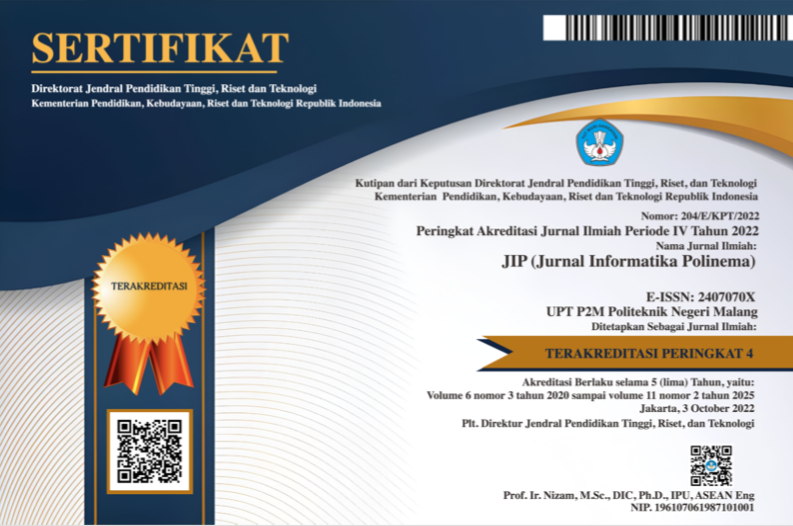IMPLEMENTASI ALGORITMA FP-GROWTH DAN APRIORI UNTUK PERSEDIAAN PRODUK
Abstract
Product inventory is an important thing that must be managed in a business, especially a retail business. Product inventory is Emyra Bedding Store's concern to maximize its services. Product inventory at the Emyra Bedding Store has not been managed properly, so several problems arise. If one of the ordered products is not available, then customer demand for a product will be hampered. In addition, sales transaction data continues to accumulate in large quantities every day and is only stored as data of unknown benefit. This study aims to determine the relationship between products with the Apriori and FP-Growth algorithms using the RapidMiner application. With this, it is expected to be a solution in managing product inventory. The research stages are data collection, data preprocessing, modeling with Apriori and FP-Growth algorithms, and evaluation of results. This study uses 150 transaction data and 17 products. The results of this study indicate that both algorithms can be used to determine association rules that can determine product linkages at the Emyra Bedding Store. The association rules generated by the Apriori algorithm are also generated by the FP-Growth algorithm. The Apriori algorithm produces 2 association rules and the FP-Growth algorithm produces 10 association rules with a minimum support of 0.05 and a minimum confidence of 0.7. The resulting relationship pattern can help the Emyra Bedding Store to monitor the stock of goods frequently purchased by customers so that there will be no supply shortage.
Downloads
References
Anggraeni, S., Iha, MA., Erawati, W. & Khairunnas, S. (2019): The Analysis of Sales by Using Apriori and FP-Growth at PT. Panca Putra Solusindo, REMIK (Riset dan E-Jurnal Manajemen Informatika Komputer), vol. 3, no. 2, pp. 41-46.
Bunda, YP. (2020): Algoritma FP-Growth untuk Menganalisa Pola Pembelian Oleh-Oleh, Riau Journal Of Computer Science, vol. 6, no. 1, pp. 34-44.
Ependi, U. & Putra, A. (2019): Solusi prediksi persediaan barang dengan menggunakan algoritma apriori (studi kasus: regional part depo auto 2000 Palembang), JEPIN (Jurnal Edukasi dan Penelitian Informatika), vol. 5, no. 2, pp. 139-145.
Fitrianah, D. & Zain, SY. (2021): Analysis of Consumer Purchase Patterns on Handphone Accessories Sales Using FP-Growth Algorithm, International Conference on Engineering, Technology and Social Science (ICONETOS 2020) Atlantis Press.
Junaidi, A. (2019): Implementasi Algoritma Apriori dan FP-Growth Untuk Menentukan Persediaan Barang, Jurnal Sisfokom (Sistem Informasi dan Komputer), vol. 8, no. 1, pp. 61-67.
Kurniawati, L. Kusuma, AE. & Dewansyah, B. (2019): Implementasi Algoritma Apriori Untuk Menentukan Persediaan Spare Part Compressor, CESS (Journal of Computer Engineering, System and Science), vol. 4, no. 1, pp. 6-10.
Kusrini & Luthfi, ET. (2009): Algoritma Data Mining. Yogyakarta: Andi.
Maulidiya, H. & Jananto, A. (2020): Asosiasi Data Mining Menggunakan Algoritma Apriori Dan Fpgrowth Sebagai Dasar Pertimbangan Penentuan Paket Sembako, Proceeding SENDIU 2020, pp. 36-42.
Pahlevi, O., Sugandi, A. & Sintawati, ID. (2018): Penerapan Algoritma Apriori Dalam Pengendalian Kualitas Produk, Sinkron: jurnal dan penelitian teknik informatika, vol. 3, no. 1, pp. 272-278.
Rahmawati, F. & Merlina, N. (2018): Metode Data Mining Terhadap Data Penjualan Sparepart Mesin Fotocopy Menggunakan Algoritma Apriori, PIKSEL: Penelitian Ilmu Komputer Sistem Embedded and Logic, vol. 6, no. 1, pp. 9-20.
Riszky, AR. & Sadikin, M. (2019): Data Mining Menggunakan Algoritma Apriori untuk Rekomendasi Produk bagi Pelanggan, Jurnal Teknologi dan Sistem Komputer, vol. 7, no. 3, pp. 103-108.
Romadhon, W. (2019): Data Mining Dalam Menentukan Cross Selling Produk Citramart Menggunakan Algoritma FP-Growth, Universitas AMIKOM Yogyakarta.
Salam, A., Zeniarja, J., Wicaksono, W. & Kharisma, L. (2018): Pencarian Pola Asosiasi Untuk Penataan Barang Dengan Menggunakan Perbandingan Algoritma Apriori dan FP-Growth (Study Kasus Distro Epo Store Pemalang), Dinamik, vol. 23, no. 2, pp. 57-65.
Setyorini, SG., Mustakim, M., Adhiva, J. & Putri, SA. (2020): Penerapan Algoritma FP-Growth dalam Penentuan Pola Pembelian Konsumen, In Seminar Nasional Teknologi Informasi Komunikasi dan Industri, pp. 180.
Utama, KMRA., Umar, R. & Yudhana, A. (2020): Penerapan Algoritma Fp-Growth Untuk Penentuan Pola Pembelian Transaksi Penjualan Pada Toko Kgs Rizky Motor, Dinamik, vol. 25, no. 1, pp. 20-28.
Witten, IH., Frank, E. & Hall, MA. (2011): Data Mining: Practical machine learning tools and techniques: Third Edition, Elsevier.
Copyright (c) 2022 Dewi Anisa Istiqomah, Yuli Astuti, Siti Nurjanah

This work is licensed under a Creative Commons Attribution-NonCommercial 4.0 International License.
Copyright for articles published in this journal is retained by the authors, with first publication rights granted to the journal. By virtue of their appearance in this open access journal, articles are free to use after initial publication under the International Creative Commons Attribution-NonCommercial 4.0 Creative Commons CC_BY_NC.
















